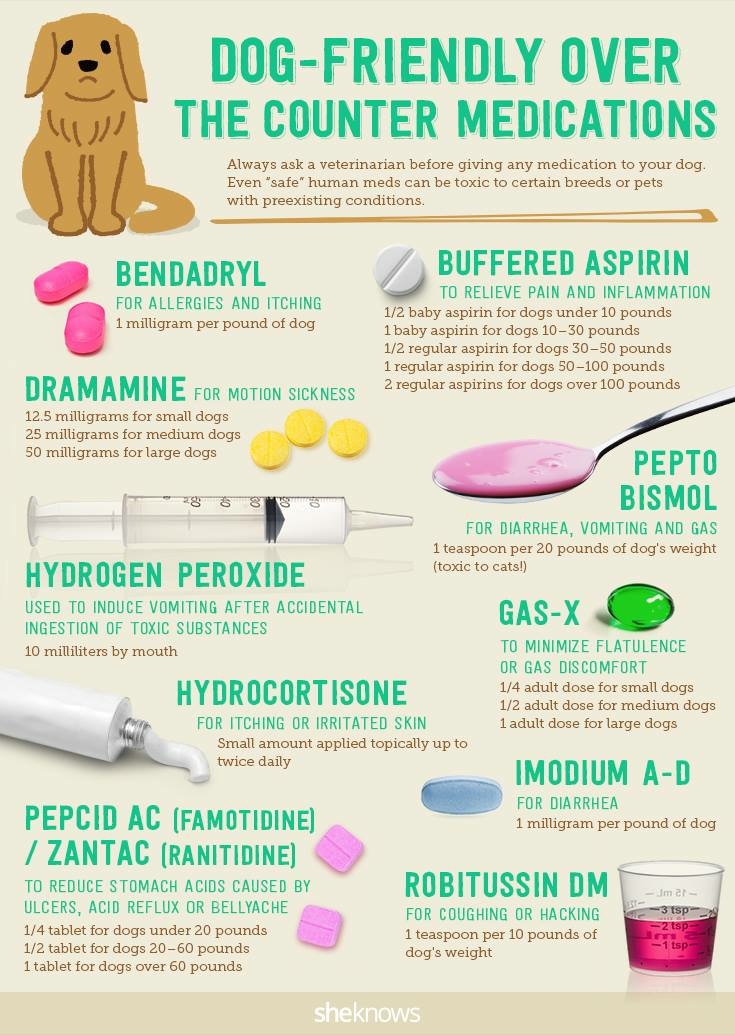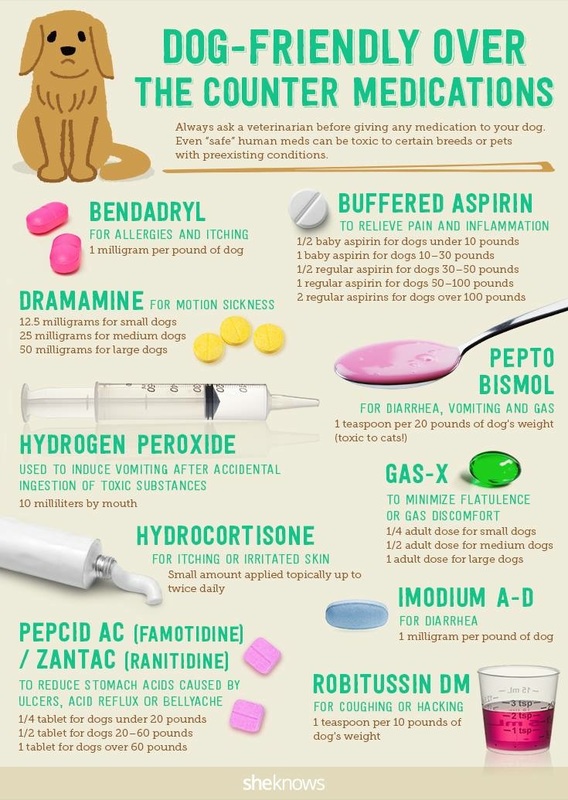Over-the-counter (OTC) medicine for dogs such as Benadryl can help with allergies, while Pepto-Bismol can aid in mild gastrointestinal issues. When searching for OTC medicine for your four-legged friend, it’s essential to choose products specifically formulated for dogs and to consult with a veterinarian before administering any medications.
While OTC options can provide relief for certain conditions, it’s important to remember that not all human medications are safe for dogs. Some OTC medicines may also have adverse interactions with any other medications your dog may already be taking.
Understanding which OTC medicines are safe and effective for your dog’s specific needs can help ensure their well-being and comfort without the risk of potential harm. Always prioritize your dog’s health and consult a professional for guidance when necessary.

Credit: vcahospitals.com
Determining If Over The Counter Medicine Is Suitable For Dogs
When it comes to the health and well-being of our furry friends, it’s important to ensure that any medication we give them is safe and effective. While there are many over the counter medicines available for humans, determining if these medications are suitable for dogs requires careful consideration and expert advice. In this article, we will explore the key factors to consider when evaluating the suitability of over the counter medicine for dogs.
Consulting A Veterinarian
When considering giving your dog over the counter medicine, it is crucial to consult a veterinarian. A veterinarian is the best source of information and guidance when it comes to your dog’s health. They have the knowledge and expertise to determine the most appropriate treatment for your dog’s specific condition. Consulting a veterinarian is especially important if your dog has any underlying health conditions or is currently taking medication.
The veterinarian will assess your dog’s medical history and conduct a thorough examination to determine if over the counter medicine is suitable. They will take into account factors such as your dog’s age, breed, weight, and any known allergies or sensitivities. This personalized approach ensures that the medication recommended is safe and effective for your furry companion.
Understanding The Risks And Benefits
Before giving your dog any over the counter medicine, it’s important to understand both the risks and benefits associated with the medication. While some over the counter medicines may be safe for dogs in certain situations, others can be potentially harmful or even toxic.
Make sure to thoroughly research and read the label of any medication you are considering for your dog. Look for specific information regarding dosage and potential side effects. If you are unsure about any aspect of the medication, consult your veterinarian for clarification.
Additionally, it’s important to consider the potential interactions between the over the counter medicine and any other medications your dog may be taking. Certain medications can interact negatively, leading to adverse effects or reduced efficacy. Your veterinarian will be able to provide guidance on any potential medication interactions.
Ultimately, when determining if over the counter medicine is suitable for your dog, consulting a veterinarian and understanding the risks and benefits are crucial steps. By taking a proactive and informed approach to your dog’s healthcare, you can ensure that any medication administered is safe, effective, and tailored to your pet’s specific needs.

Credit: lakewooddogpark.com
Common Over The Counter Medicines For Dogs
When it comes to caring for our furry friends, it’s essential to know which over the counter medicines are safe and beneficial for dogs. From pain relief to digestive health aids, there are several options available. Understanding the common over the counter medicines for dogs can help you make informed decisions about your pet’s well-being.
Pain Relief Medications
For dogs experiencing pain or discomfort, certain over the counter medications can provide relief. When administered in the correct dosage, these medications can help manage mild to moderate pain and inflammation. It’s crucial to consult with a veterinarian before giving your dog any pain relief medication to ensure their safety and well-being.
Antihistamines
Dogs can suffer from allergies and allergic reactions, just like humans. Antihistamines are commonly used to alleviate symptoms such as itching, sneezing, and watery eyes in dogs. However, it’s important to use antihistamines specifically formulated for dogs and consult with a veterinarian before giving them to your pet to avoid any potential adverse effects.
Digestive Health Aids
Maintaining your dog’s digestive health is essential for their overall well-being. Over the counter digestive health aids such as probiotics and digestive enzymes can help promote a healthy gut flora and aid in digestion. However, it’s essential to choose products specifically designed for dogs and consult with a veterinarian to determine the most suitable option for your pet’s needs.
Usage And Dosage Guidelines
When using over the counter medicine for dogs, it’s essential to adhere to proper usage and dosage guidelines to ensure the safety and effectiveness of the treatment. Understanding the appropriate administration techniques and dosages is crucial for pet owners to provide the best care for their furry companions.
Proper Administration Techniques
Administering over the counter medicine to dogs requires careful attention to proper techniques. It’s important to consider the form of the medication, whether it’s a tablet, liquid, or topical treatment. For oral medications, administer them with food to minimize any potential stomach upset. For topical treatments, ensure the affected area is clean and dry before application.
Understanding Appropriate Dosages
Understanding the appropriate dosage for your dog is essential to avoid under or overmedication. The dosage often depends on the weight of the dog, so it’s crucial to consult a veterinarian or carefully read the product labeling. Follow the recommended dosage instructions provided by the manufacturer or your vet, and do not exceed the prescribed amount unless directed by a professional.
It’s important to note that not all human over the counter medicines are safe for dogs, so always consult a veterinarian before administering any medication. Additionally, look for specific over the counter medicines formulated for dogs, as they are tailored to their specific physiological needs.

Credit: www.facebook.com
Safety Precautions And Side Effects
Dogs are loyal companions and beloved members of our families. Just like humans, dogs can experience various health issues that may require over-the-counter (OTC) medication for relief. However, it’s important to be aware of the safety precautions and potential side effects associated with these medicines. By taking the necessary precautions and monitoring your dog’s response, you can ensure their well-being. Knowing when it’s appropriate to seek veterinary assistance is also crucial. In this article, we will discuss the safety precautions, potential risks and side effects, monitoring your dog’s response, and when to seek veterinary assistance when using OTC medicine for your furry friend.
Potential Risks And Side Effects
While OTC medicine can provide relief for certain conditions in dogs, it’s important to understand that they come with potential risks and side effects. These risks and side effects can vary depending on the type of medicine, dosage, and individual dog’s response. It’s crucial to be well-informed about these risks and side effects before administering any medication to your dog.
| Common Side Effects | Serious Side Effects |
|---|---|
|
|
Monitoring Your Dog’s Response
Once you have administered the OTC medicine to your dog, it’s important to closely monitor their response. Keep an eye on any changes in behavior, appetite, or physical symptoms. It’s advisable to maintain a journal to document any side effects or improvements noticed in your dog. Regular monitoring will enable you to identify any potential concerns or adverse reactions promptly.
- Observe your dog for any discomfort
- Keep track of any changes in behavior
- Take note of any improvements or worsening of symptoms
- Measure food and water intake
When To Seek Veterinary Assistance
While many OTC medicines can be safely administered to dogs, there might be situations where it’s necessary to seek prompt veterinary assistance. It’s vital to recognize the red flags that indicate you should consult a veterinarian:
- Severe or persistent vomiting and diarrhea
- Excessive drowsiness or lethargy
- Significant change in appetite, either loss of appetite or excessive hunger
- Abnormal bleeding or bruising
- Unexplained changes in behavior or mood
Remember, your veterinarian is the best person to guide you through any concerns regarding your dog’s health. They can offer expert advice and recommend appropriate alternatives or treatments if needed.
Natural Remedies And Alternative Options
When it comes to taking care of our furry friends, finding safe and effective solutions for their health issues is a top priority. While over-the-counter medications can be helpful, some pet owners prefer to explore natural remedies and alternative options for their dogs. These options, which include natural supplements and non-medication approaches, can provide a gentler and potentially more sustainable approach to canine health. In this article, we will delve into exploring natural supplements and non-medication approaches to help you make informed decisions for your beloved canine companion.
Exploring Natural Supplements
Dogs, like humans, can benefit from natural supplements that support their overall health and well-being. These supplements can aid in a variety of areas, such as immune system support, joint health, digestion, and anxiety relief. Here are some popular natural supplements that can be beneficial for dogs:
- Fish oil: Rich in omega-3 fatty acids, fish oil can promote a healthy coat, reduce inflammation, and support cognitive function.
- Probiotics: These beneficial bacteria can improve digestion and strengthen the immune system.
- Glucosamine and chondroitin: These supplements are known for their ability to support joint health and reduce arthritis symptoms.
Non-medication Approaches To Canine Health
In addition to natural supplements, there are several non-medication approaches that can contribute to your dog’s overall health and well-being. These approaches can be used alone or in conjunction with traditional medication:
- Adequate exercise: Regular physical activity not only keeps your dog physically fit but also helps to maintain a healthy weight and improve their mental well-being.
- Proper nutrition: Feeding your dog a balanced and nutritious diet is crucial for their overall health. Consult with your veterinarian to determine the best diet for your dog’s specific needs.
- Stress reduction: Just like humans, dogs can experience stress and anxiety. Providing a calm and secure environment, incorporating relaxation techniques, and using tools like calming pheromone diffusers can help reduce their stress levels.
Frequently Asked Questions Of What Over The Counter Medicine Is Good For Dogs
What Over The Counter Medicine Can I Give My Dog For Pain Relief?
Over-the-counter pain medicines like aspirin should not be given to dogs as they can be toxic. It is best to consult with a veterinarian to determine the appropriate pain relief medication for your dog.
Can I Give My Dog Over The Counter Medicine For Allergies?
While some over-the-counter antihistamines may be safe for dogs, it is crucial to consult with a vet to determine the correct dosage and medication suitable for your dog’s allergies. Self-administering can lead to adverse effects and potentially harm your pet.
What Over The Counter Medicine Can I Give My Dog For Diarrhea?
It is recommended to consult a veterinarian before giving any over-the-counter medicine for dog diarrhea. Diarrhea can be a symptom of an underlying health issue, and a vet can determine the appropriate treatment, ensuring your dog’s safety and well-being.
Conclusion
To ensure the well-being of our furry friends, it’s important to have knowledge about over-the-counter medicines suitable for dogs. By understanding their specific needs and consulting with a veterinarian, we can make informed decisions when it comes to their health.
From antihistamines to pain relievers, there are various options available for our canine companions. Always remember that putting their safety first is crucial, and seeking professional advice is key in providing the best care for our beloved pets.



